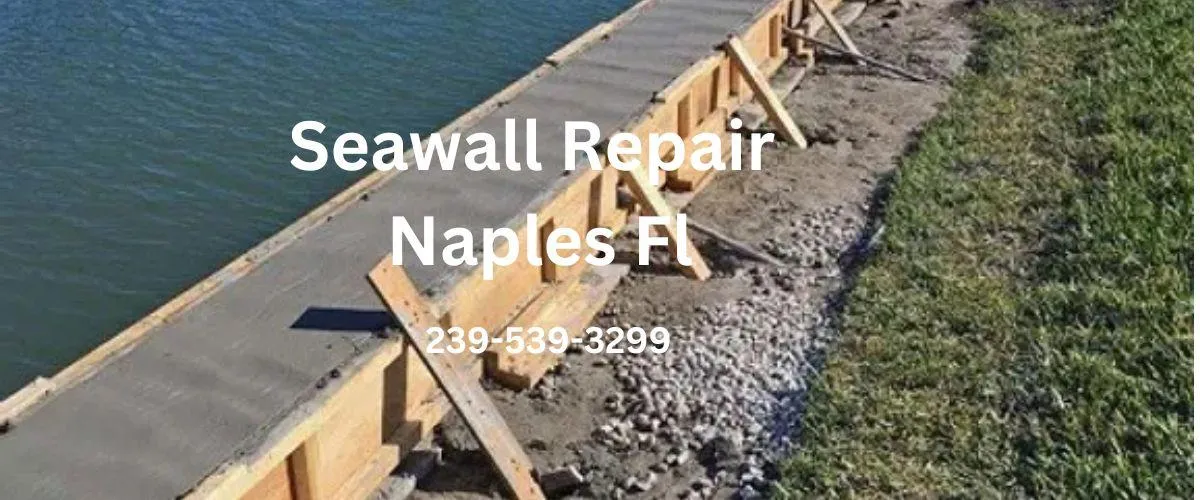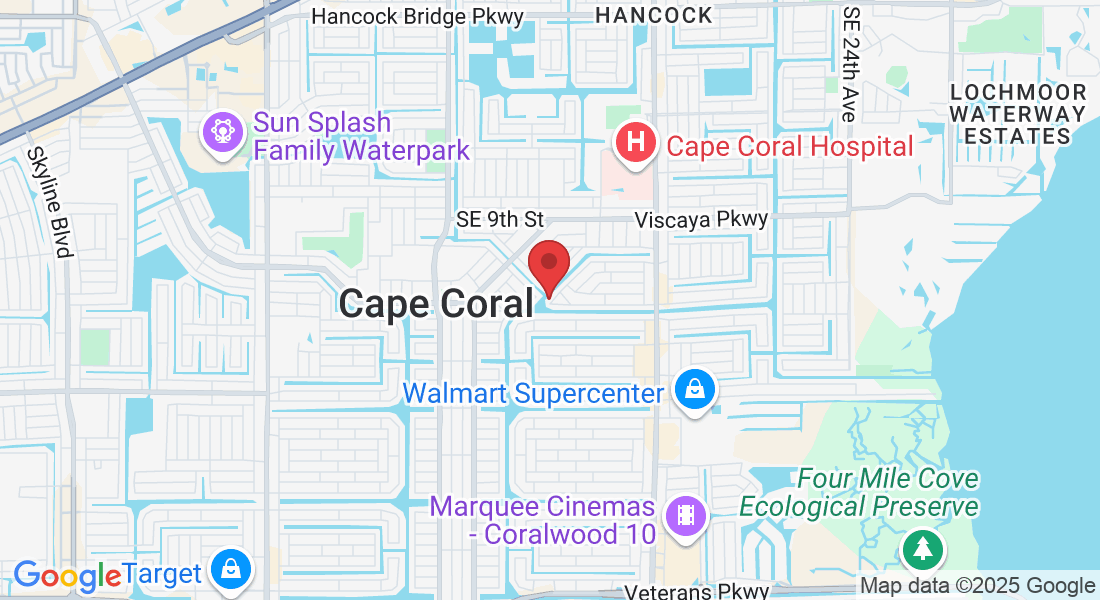
Seawall Repair Naples FL
Did you know Seawall Repair Cape Coral does business in Naples, FL? What this means that we are hopeful to be able to help Naples residents like we have our Cape Coral residents protect their seawalls from erosion by offering top notch service.
When it comes to seawall repair Naples FL, there are several options to consider. Let's look at the materials and methods available, including a new alternative that's gaining popularity. We use each of these methods because each situation is unique that we come across.
Concrete remains a common choice for seawall repair Naples FL. It's durable and can withstand strong waves. Concrete seawalls typically cost between $150 and $400 per foot to repair. While concrete is strong, it can crack in extreme heat and may weaken over time due to salt exposure.
Vinyl is another option that's becoming more popular. It costs around $100 to $200 per foot and doesn't rust or rot. Vinyl holds up well against saltwater, but it can become less sturdy in very hot weather.
For a more natural look, some homeowners choose wood. It's cheaper, ranging from $50 to $150 per foot. However, wood doesn't last as long as other materials, especially in Naples' hot and humid climate.
Steel is a strong choice for areas with powerful waves. It costs about $200 to $400 per foot. The downside is that steel can rust in saltwater, so it needs special protective coatings.
Now, let's talk about an alternative that we use often that is bringing great success for us and our customers: polyurethane foam injection. This method is becoming popular in seawall repair Naples FL.
Here's why: Polyurethane foam injection is a cost-effective solution that can often be less than half the price of replacing a seawall. It's quick to apply and causes minimal disruption to your property. The foam fills cracks and voids, making your seawall stronger and more water-resistant.
One big advantage of polyurethane foam is its ability to stop high-flow leaks and bind loose soil. This helps prevent erosion behind the seawall, a common problem in Naples. The foam sets quickly, usually in about 10 minutes, compared to cement grout which can take days to harden.
Polyurethane foam is also environmentally friendly. It's approved for contact with drinking water and doesn't harm marine life. This is especially important for Naples' delicate coastal ecosystem.
When choosing a material for seawall repair Naples FL, it's crucial to consider how it will hold up in the local climate. Naples' hot, humid weather and salty air can be tough on seawalls. Polyurethane foam and vinyl tend to handle these conditions better than wood or untreated concrete.
Seawall Repair Cape Coral has years of experience in dealing with Florida's unique coastal challenges. Our team can assess your seawall and recommend the best repair method, whether it's traditional materials or the innovative polyurethane foam injection.
Remember, a well-maintained seawall is crucial for protecting your waterfront property. We know that the residents we work with have budgets and we work with each one of them with the one goal in mind of giving our best options available to achieve the end result which is a solid seawall rebuilt to protect the homeowners property from flooding.
What is Polyurethane Foam Injection?
This process works by drilling tiny holes the size of a dime into your damaged seawall. Once this is done our workers are able to inject polyurethane foam into these created holes. Once inside the foam expands and hardens quickly.
When we use this foam, we don't need big machines, so your yard does not have tracks in the yard. The foam can make your seawall last twice as long as before. It fills up all the cracks and holes, and it even helps keep the dirt around the seawall from washing away. The foam is light, so it doesn't make the seawall too heavy.
It also keeps water out really well. Many types of this foam are safe for the environment and won't hurt the water. The foam gets hard in about 10 minutes, which is way faster than cement. It can stop big leaks, fill empty spaces behind the seawall, and make loose dirt stick together.
All these things make polyurethane foam a really good way for seawall repair Naples, FL. It works well and is easy to use, which is why more and more people are choosing it for their seawall repairs.
Are there any risks or downsides to using polyurethane foam for seawall repairs?
Using polyurethane foam for seawall repair Naples FL has many benefits, but there are some things to be careful about. At our company, we only use closed cell polyurethane foam because it's the best choice for the extremely hot conditions in South Florida. Here's what you should know:
Closed cell foam is great for hot weather because it keeps its shape and strength even when it's really hot outside. It doesn't let water or moisture get through, which is super important for seawalls. This type of foam also adds extra strength to the seawall, which is good for protecting against storms.
However, there are a few downsides to think about. Even though closed cell foam is safer for the environment than some other options, it might still release some chemicals into the air when it's first applied. But don't worry - this only happens for a short time, and we take special care to keep everyone safe during the process.
Another thing to remember is that while closed cell foam lasts a long time, it might need to be checked and fixed every now and then. The sun and salty water can slowly wear it down over many years. Also, if you ever need to change your seawall in the future, it can be tricky to remove the foam because it sticks so well.
Closed cell foam can be more expensive than some other repair methods, but it often saves money in the long run because it works so well and lasts a long time. Sometimes, you might need special permission from the city to use foam on seawalls, but we can help with that.
Even though there are a few challenges, we believe closed cell polyurethane foam is the best choice for seawall repairs in Naples, FL. It handles the heat really well, keeps water out, and makes seawalls stronger. We've seen great results with it, and that's why it's the only type of foam we use for our seawall repairs.
Committed to Quality Solutions for Your Waterfront Property In Naples
We are all about using the best materials to for your seawall repair Naples FL. We know that closed cell polyurethane foam works really well in the hot weather we have here in South Florida. It's strong, keeps water out, and lasts a long time. But we also know that every seawall is different. That's why we work closely with our customers to figure out the best plan for your seawall.
Sometimes, we might need to use other materials along with the foam to make your seawall super strong. We'll always explain everything to you in a way that's easy to understand. Our team knows a lot about seawalls and how to fix them. We promise to use the best materials and methods for your specific seawall problem. We'll help you come up with a plan that makes sense and doesn't cost too much. At Seawall Repair Cape Coral, we're committed to doing a great job and making sure our customers are happy with their fixed seawalls.
Seawall Repair Cape Coral
